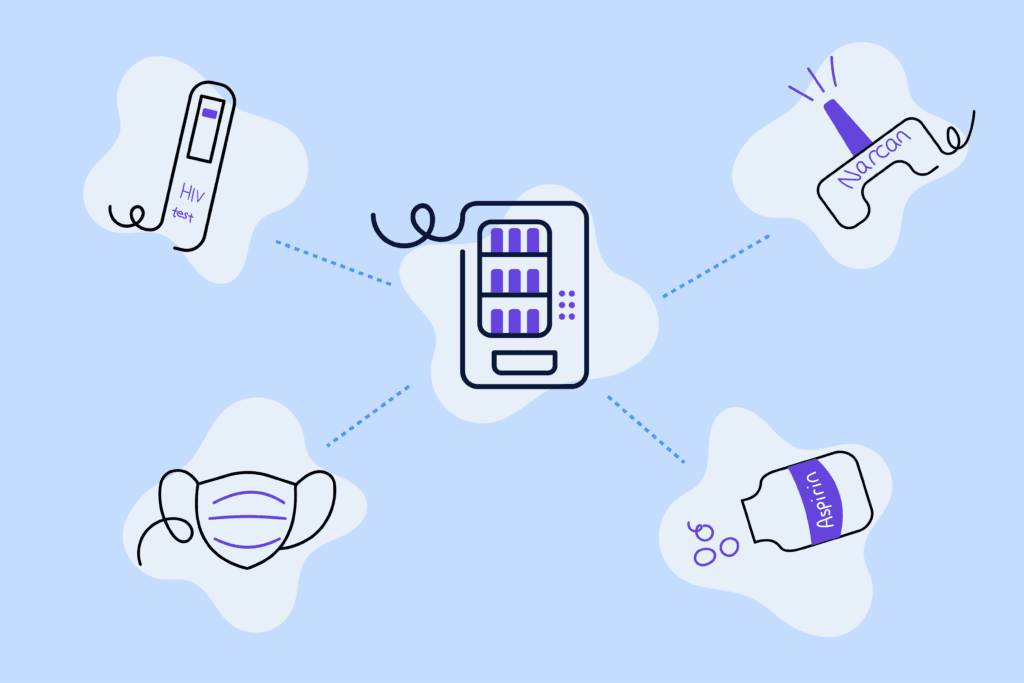
Primary.Health dispenses at-home diagnostic tests via vending machines for 24/7 healthcare access.
Think of vending machines, and you probably envision mouthwatering rows of snacks, candy, and cold drinks. Or maybe cell phone accessories and cosmetics if you’re strolling to an airport gate.
Recently, however, the healthcare industry has begun to rethink vending machines as a means of dispensing essential and emergency health items and services. These items range from athome testing to harm reduction supplies to emergency contraception.
Vending machines fill healthcare void
Primary.Health is at the forefront of vending machine healthcare. Several years ago, we began dispensing lab-based PCR diagnostic tests from vending machines at UCLA and other colleges. The program expanded healthcare access to these college students 24/7. Also, the students could take the tests in the privacy of their dorms or homes, with results sent directly to the student.
Along with community vaccination clinics, at-home testing for STIs and other conditions, and virtual healthcare, Primary.Health views vending machines as another easy, efficient way to improve healthcare access beyond clinic walls. For college students, vending machines fill a void for those who lack off-campus transportation to obtain needed healthcare services. Or who may be too embarrassed to ask for a test at the campus health center.
Community partners who choose Primary.Health’s vending machine option benefit from the same flexible technology platform that powers all our clinic models. They also receive the same program management, data analytics, clinical support, and participant support our community partners have come to expect.
Potential for vending machine healthcare
With their convenience, efficiency, and widespread availability, vending machines have become a crucial public health tool. Here are a few ways vending machines are revolutionizing healthcare:
- Harm reduction: Many cities, including Brooklyn, are making Narcan and other anti-overdose supplies available to residents. In Brooklyn, supplies are free and available 24/7; the resident only needs to enter a New York zip code on the machine keypad. A similar vending machine in Norwalk, CT dispenses fentanyl test strips, COVID-19 tests, condoms, and safe sex kits.
- Reproductive health: Following the U.S. Supreme Court’s overturning of Roe v. Wade, at least 39 colleges and universities across 17 states have implemented emergency contraception vending machines on campus. Some of these schools are located in places that have largely banned or restricted abortion access. Available items include Plan B, condoms, and other health products like ibuprofen and pregnancy tests.
- Medication: Laws to permit the dispensing of prescription medications in secure vending machines are advancing in many states. Medications under consideration include chronic disease treatments, contraception, and EpiPens. Such a vending machine already exists in a Singapore hospital, where it also offers telehealth consults for prescription medications.
- Virtual health screening and testing: Some vending machines can conduct rapid tests for various conditions like diabetes or STIs, offering a discreet and efficient way for individuals to monitor their health. By placing them in public spaces or workplaces like Tampa General Hospital, people can easily access vital health information without the need for appointments or waiting rooms.
- PPE: We’ve all seen the vending machines that sprung up during the COVID-19 pandemic, when demand for PPE skyrocketed. The New York MTA installed 10 such machines at popular subway stops to dispense items like face masks, hand sanitizers, gloves, and disinfecting wipes.
The integration of vending machines into healthcare services has transformed the way individuals access essential products and services and expanded healthcare accessibility.
Primary.Health continually evaluates healthcare options for vending machines to meet the needs of communities. Contact us to find out if vending machines are the right fit for dispensing testing or other health services to your community or population.
